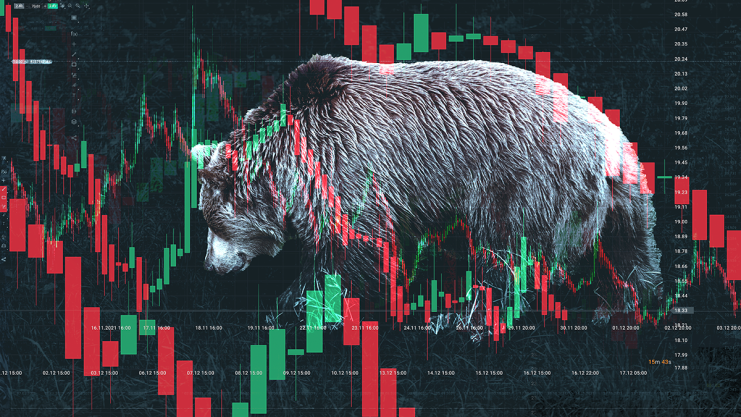
UK in Recession: an Overview of What Could Happen & How You Can Take Advantage

Recently, the Bank of England has issued a warning about a slowdown in economic growth towards the end of 2022, with similar worries persisting into 2023. Overall, the upcoming emergence of a recession has been fuelled by a mix of several detrimental dynamics for the UK.
Uncovering the Dynamics that Lead to Recession
The United Kingdom, which is still recuperating from the effects of the coronavirus pandemic, is suffering a labour shortage while demand rises, driving up the cost of products and services. The government is increasing interest rates in response to inflation reaching levels not seen since the 1990s. All of this is accompanied by enormous rises in energy costs, which were already on the rise before the Russia-Ukraine war, with government-imposed restrictions on Russian oil and gas adding further to the price increases.
Households are already experiencing the effects of the rising cost of living, and although higher interest rates may help combat inflation, they pose a threat to the economy’s growth. If unemployment begins to climb, this may trigger a full-scale recession in the coming months.
During 2022, the economic prognosis for the United Kingdom has worsened. Throughout the year, experts anticipate the UK’s GDP growth to average between 3.1% and 3.6%, followed by two years of sluggish or even negative growth. Some estimate that in the first half of 2023, inflation might reach its high of 17%, but if the government continues to subsidise home energy bills, inflation might peak between 10 and 13%.
According to Goldman Sachs, the British economy is expected to enter a severe recession by the end of 2022, with the contraction extending until 2024. In this vein, the Bank of England also anticipates a significant decline towards the end of the year, with a decrease of over 1% between October and December. The next year’s GDP is projected to stay below 2022 levels for the whole of 2023, with annual growth near 0%.
Preparing for a Recession…
During an economic downturn, many of the largest corporations often see a decline in earnings. Simply the prospect of a recession may be all that is required for a stock market decline, or even collapse. However, these economic downturns may generate some of the finest buying opportunities, despite investors’ trepidation. Many investors saw the 2008 financial crisis as the end of the world, yet it was a once-in-a-lifetime buying opportunity before a ten-year bull market.
Although no one can accurately forecast when a recession will occur, it is advisable to take the necessary precautions to secure your portfolio when enough economic indications point to an economic slump.
Diversification – Reducing Risk for Investors
Without a doubt, portfolio diversification is one of the greatest ways to reduce risk. When you diversify, you spread your bets over various asset classes and businesses. Thus, if one sector fails, the portfolio as a whole is not so badly affected. This is sound advice, regardless of the current economic climate. Nonetheless, it is more important when the economy is struggling and increasing numbers of companies are experiencing the consequences of the crisis.
Financial advisors may estimate the optimal moment to invest but attempting to “time” the market is often futile. A recession may generate price volatility, but it is impossible to predict when the low point will occur or if it has already occurred.
According to experts, one of the simplest ways to take advantage of this is to use a practice known as dollar-cost averaging. This simply entails continually adding to investment portfolio, month-by-month, or even annually, regardless of market fluctuations. In this way, you’ll be able to take advantage of downturn periods by buying cheap, while enjoying the long-term returns of rising markets.
Adopt a Long-term Outlook
Short-term market volatility should not concern you if you are still several years away from retirement. According to historical evidence, these are entirely typical phases of the economic cycle, and things tend to recover. After the Great Recession, the Dow Jones Industrial Average peaked around four years later. But here’s a little secret: long-term investors who stayed the course were in the best position to profit the most.
As a consequence of inflation, living expenses might spiral out of control. Lenders might tighten their lending conditions, making it more difficult for individuals to fulfil their commitments. Also susceptible to depreciation are real estate and other assets, diminishing people’s financial stability. And sadly, a recession tends to affect young people and low-income employees the most.
Moreover, today’s global economy is intricately intertwined, so if the United Kingdom is experiencing a recession, it is likely that other countries will be suffering in a similar way. Because of their extensive interdependencies, the United Kingdom’s entry into recession may cause other markets to decline and vice versa. For the global economy to avoid a recession, we would need effective and timely actions from governments and central banks, but also a good slice of luck. This is particularly the case considering the pandemic and continuing political insecurity.
Next Steps
It’s essential to ensure you have the right skills and knowledge to capitalise on the opportunities presented from a recession and studying a trading course at an accredited, award-winning academy can help provide you with an advantage. The London Academy of Trading’s combination of practical application and theory can provide you with the skills to thrive in financial markets, whilst their 10h/day support can help provide immediate help and advice.